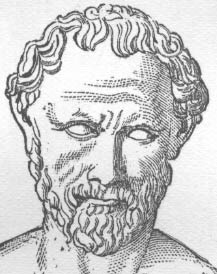Demosthenes
|
|
- For the Athenian general during the Peloponnesian War, see Demosthenes (general).
Demosthenes (384 BC – 322 BC) is generally considered the greatest of the Attic orators, and thus the greatest of all Ancient Greek orators. His writings provide an insight into the life and culture of Athens at this period of time.
Born the son of a wealthy sword-maker, Demosthenes was orphaned at the age of seven. His father left him well-provided-for, but his legal guardians defrauded him and squandered his inheritance, causing him to seek retribution through the courts when he came of age.
As a boy Demosthenes suffered from a speech impediment and he worked at a series of self-designed exercises to overcome it. A common story tells of his talking around mouthfuls of rocks to improve his diction, but it is unknown whether this is fact or merely a legendary example of his perseverance and determination. Either way, Demosthenes became a prominent logographer and political orator (speech-maker), making his living through his ability to write and make speeches. He is best-known for his Philippic Orations, urging the populace to rise up and defend their country against Philip II of Macedon, who was steadily gaining power and territory for the Macedonian state.
Demosthenes's speaking style was relatively straightforward and generally without rhetorical flair. It was considered somewhat vulgar by the standards of the day, but was nevertheless very popular. He also made use of his body to accentuate his words, and as a result was able to project his ideas and arguments much more forcefully (later famous orators like Henry Clay would mimic this technique). Although Demosthenes's arguments were the products of careful study and preparation – he often declined to comment on subjects he had not studied beforehand – he was famous for his sharp wit, and his name has been used to imply a particularly venomous rejoinder.
In 346 BC Demosthenes was one of many envoys sent to Philip II of Macedon to create a peace treaty. Upon their return, Demosthenes led the potentially fatal prosecution of his fellow envoys based on the ill reception of the treaty's terms and Philip II's actions immediately prior to its agreement. The prosecution was discredited when politician and envoy Aiskhines disenfranchised Demosthenes' fellow, possibly lead, prosecutor, Timarkhos, by convincing the jury he had prostituted himself to another male while young. Demosthenes was also accused of sexual and gender impropriety. Aiskhines attributed Demosthenes' nickname, Batalos ("arse"), to his "unmanliness and kinaidiā" and frequently commented on his "unmanly and womanish temper", even criticising his clothing: "If anyone took those dainty little coats and soft shirts off you ... and took them round for the jurors to handle, I think they'd be quite unable to say, if they hadn't been told in advance, whether they had hold of a man's clothing or a woman's." (Dover, 1989)
Demosthenes is also implicated in passive homosexuality and the prostitution of youth (Aiskhines iii 162): "There is a certain Aristion, a Plataean..., who as a youth was oustandingly good-looking and lived for a long time in Demosthenes' house. Allegations about the part he was playing [lit., 'undergoing or doing what'] there vary, and it would be most unseemly for me to talk about it." (Dover, 1989)
Demosthenes was exiled after a convoluted affair involving money taken by one of the lieutenants of Alexander the Great. He was recalled to the Greek states after Alexander died, where he attempted once again to rally the Athenian people against Macedonia, but he was unsuccessful and took poison rather than face capture and punishment.
The historian Plutarch drew attention in his Life of Demosthenes to the strong similarities between the personalities and careers of Demosthenes and Marcus Tullius Cicero:
- The divine power seems originally to have designed Demosthenes and Cicero upon the same plan, giving them many similarities in their natural characters, as their passion for distinction and their love of liberty in civil life, and their want of courage in dangers and war, and at the same time also to have added many accidental resemblances. I think there can hardly be found two other orators, who, from small and obscure beginnings, became so great and mighty; who both contested with kings and tyrants; both lost their daughters, were driven out of their country, and returned with honour; who, flying from thence again, were both seized upon by their enemies, and at last ended their lives with the liberty of their countrymen.
References
- http://www.bartleby.com/65/de/Demosthe.html
- http://members.tripod.com/~michaelroth/bio054.htm
- The text quoted from Plutarch is taken from John Dryden's translation, found here (http://whitewolf.newcastle.edu.au/words/authors/P/Plutarch/prose/plutachslives/demosthenes.html).
- K.J. Dover, (1989). Greek Homosexuality. Cambridge, Mass.: Harvard University Press. ISBN 0674362705.
Demosthenes as a fictional character
In the historical novel Fire from Heaven by Mary Renault, Demosthenes is depicted as the chief villain – arrogant, deceitful and lustful, who attempts to sexually molest the young Alexander but gets a humiliating come-uppance. At the battle of Chaeronea, he acts with cowardice, throwing down his shield and weapons to run for his life. Later he conspires to assassinate King Phillip. These depictions are mostly speculative on Renault's part, except for his behaviour at Chaeronea, which is borne out by the historical record.
Demosthenes (a conscious nod to Demosthenes) was used as an online pseudonym by Peter Wiggin and Valentine Wiggin in the Ender's Game series of books by Orson Scott Card.
Demosthenes is the namesake of the Demosthenian Literary Society at the University of Georgia in Athens, Georgia, United States. The Demosthenian Literary Society was founded in 1803, making it the oldest literary society in that country.de:Demosthenes eo:Demosteno fr:Démosthène (orateur) he:דמוסתנס nl:Demosthenes no:Demostenes uk:Демосфен

